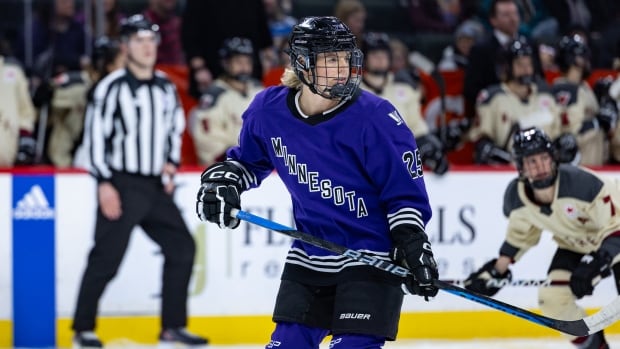Burlington’s Emma Greco played for two other professional hockey leagues before the Professional Women’s Hockey League (PWHL), but says she’s never seen the kind of interest the women’s game is experiencing now – and credits it largely to television.
“People I haven’t talked to in a while, they’ll message me and say, ‘I was watching you on TV,’ or they’ll post me in an Instagram story saying they were watching my game at a bar somewhere,” said Greco, a former Burlington Barracuda who, as a defender for Minnesota, has had nine shots and four penalty minutes in the PWHL this year.
“It’s crazy.”
In Greco’s previous leagues – the Canadian Women’s Hockey League and the Premier Hockey Federation (PHF) – most games weren’t televised, making it nearly impossible for fans who couldn’t be there in person regularly to follow the rivalries or get to know the players.
“Our championship game was only on TV. It wasn’t a consistent thing,” says Greco, whose current squad led the league for much of January, but is now second in the standings behind Montreal. “It’s been a lot of fun so far.”
In between growing up in Burlington, Ont., and her current gig as a defender for Minnesota in the Professional Women’s Hockey League, Emma Greco, 28, earned scholarships for hockey and soccer, a masters of business administration, and played in two other professional hockey leagues before landing in the PWHL.
Broadcasts of the league’s games in Canada are shared between CBC, Sportsnet and TSN, with the games airing on CBC also appearing on CBC Gem.
The league said its first game reached 2.9 million viewers.
‘Market it properly, people want to show up’
Greco, 28, grew up in Burlington’s Aldershot neighborhood, attending Maplehurst Public School and Aldershot High School, where she “played a bunch of sports… hockey, soccer, field hockey, basketball, badminton.”
Outside of school, she played hockey for the Burlington Barracudas up to Grade 9.
Fellow Burlington Barracudas alumnus and PWHL member Renata Fast, who plays on the new league’s Toronto team, spoke to CBC’s Metro Morning last week on the importance of visibility and marketing in developing the women’s game.
Fast, born in Hamilton before moving to Burlington, was one of the PWHL players to participate in a new official event within National Hockey League All-Star Weekend, a televised 3-on-3 women’s showcase last Thursday in Toronto.
She says the interest the league has had, including fully selling out the entire home season in Toronto on the first day tickets were available, shows there’s a big appetite for women’s hockey if people get a chance to see it for themselves, something that often starts with TV coverage.
“We’ve been playing professional hockey in the past but we never had the support we do now,” Fast told CBC. “It’s just so cool to see that when there is investment behind something and the right people are in place to market it properly, people want to show up.”
Fast said girls she has coached have said they are also watching the games on TV, which show them there is a future for them in the sport.
‘I’ve been a part of every league possible’
After the Barracudas, Greco joined the Toronto Aeros. Both clubs are part of the Ontario Women’s Hockey League, the top tier of amateur hockey for women under age 22 in the province.
The Aeros have proven to be a major training ground for members of the PWHL: according to The Hockey News, “a full 10 per cent” of current PWHL players once wore the club’s jersey, including Jessie Eldridge, Jill Saulnier, Sophie Jaques, Loren Gabel, Erin Ambrose, Laura Stacey, Daryl Watts and Claire Dalton.
Greco also played soccer throughout her youth – and was apparently pretty good at it. After her four-year hockey scholarship at Connecticut’s Quinnipiac University ended, she secured a soccer scholarship for the final year she needed to finish a masters of business administration.

“I thought I was done playing hockey,” she said, in a late January Zoom interview from her home in Minneapolis suburb Edina, which she shares with teammates Michela Cava and Mellissa Channell.
That notion didn’t last. “After the soccer season ended, I decided to join the Connecticut Whale, which was in the PHF at the time. So I did that for the rest of that year.”
Greco went from there to the Toronto Furies of the CWHL, and a series of day jobs in marketing and sales. Most recently, she was director of business development and marketing, and a skating coach, at Barnburner Hockey Academy in Toronto.
Now, she’s a full-time hockey player and says she’s “grateful” to have found her way here after such a winding path.
“I think I’ve been a part of every league possible,” she said. “It’s just really great to be kind of at the end of it and have a sustainable league that’s going to be here for a long time.”


